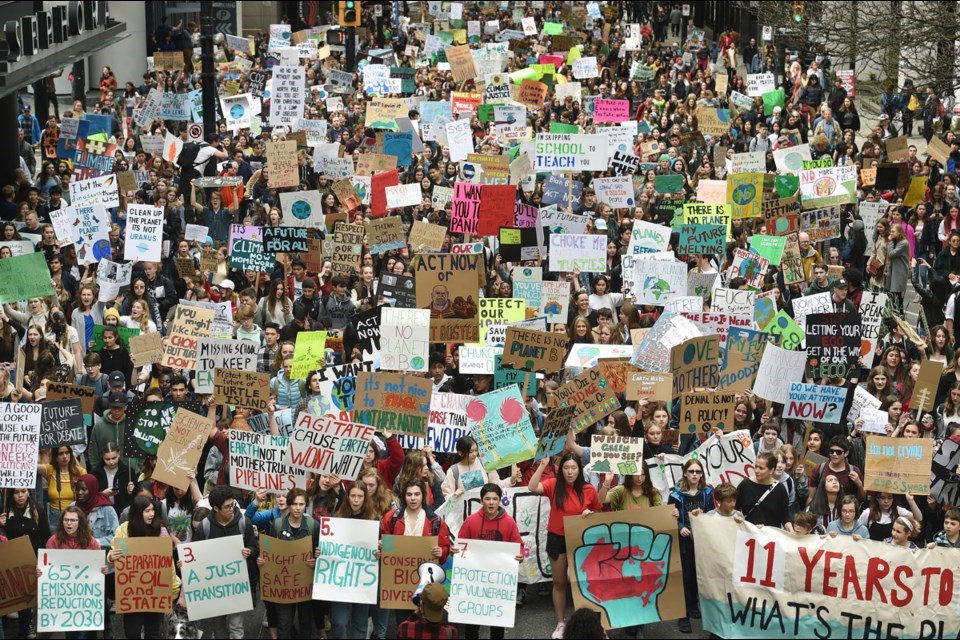Chief Adam Palmer told the Vancouver Police Board June 24 that police spent “about $2.5 million” in 2020 on deploying officers to protests — a year he described as dramatic in terms of the increase in costs associated to managing what have been largely street-based gatherings.
“2021 is on path to be even more significant and our estimate is we will spend well in excess of $3 million,” Palmer said. “By far and large, the greatest number of protests we’re seeing are environmental — whether it’s logging, [protecting] old-growth forests, TMX pipeline — those sorts of protests [are] way more than anything else.”
Vancouver police budget statistics supplied to Glacier Media show a steady increase in recent years on money spent to manage protests and demonstrations, with $478,460 in 2018, $1,033,297 in 2019 and $2,835,584 last year.
The chief said protests related to COVID-19, including those led by anti-maskers are also significant but he expected those to wane once the pandemic subsides and provincial health orders are lifted.
Political demonstrations tied to national and international events also occurred in Vancouver this year, he said, describing the city as “the epicentre” for British Columbians to gather and protest.
Some of the larger call-outs for police in recent years have related to Black Lives Matter demonstrations in the wake of George Floyd’s murder in Minnesota, drug users calling for action on the province’s overdose death crisis and public gatherings connected to Indigenous issues.
In October 2019, a police-estimated 10,000 people showed up at the Vancouver Art Gallery to listen and march with teen environmental activist Greta Thunberg.
“So any time there’s an issue, whether it’s locally, nationally or internationally, places like the Vancouver Art Gallery, Jack Poole Plaza, the Vancouver Public Library, city hall — these are places that we see incredible numbers of people showing up,” he said.
An average of 12 protests per weekend have occurred in the city this year, with Palmer noting the weekend of June 19 saw 19 protests, with four occurring simultaneously.
“Plus we still had hundreds of calls for service coming in for police officers,” the chief said, noting his department manages hundreds of protests and events every year, but doesn’t deploy officers to small gatherings.
Large demonstrations this year and in previous years have required a police response because protesters have occupied buildings, shut down bridges, intersections, rail lines and access to the Port of Vancouver.
“When our officers are at these protests, they do face a bit of a push and pull because you’ll have people who will drive by and be screaming, ‘Leave them alone’ and honking their horn and that sort of thing — and other people driving by saying, ‘Get them out of the road, you’re blocking traffic,’” the chief said. “So the public is very divided on these issues and I just want to ask the public to please be patient with us.”
Longtime environmentalist Joe Foy of the Wilderness Committee, a participant in numerous protests in Vancouver, said he wasn’t surprised that demonstrations related to the environment are on the rise.
The issues are many, he said, pointing out he was answering a reporter’s questions during a record-breaking heat wave in British Columbia, which forced the unprecedented cancellation of schools Monday.
Foy, 66, has led campaigns to stop logging in Clayoquot Sound, stop the Site C Dam project, protect the endangered spotted owl, clean up B.C.’s mining industry and continues to call for Indigenous rights to be fully recognized and protected in B.C. and Canada.
“We live in the most bio-diverse province or territory in the entire country and we are on the forefront of climate change issues — with a pipeline that we don’t want and just a whole bunch of issues,” Foy said. “So you have an informed public, a free and open system that allows us to do this and we do it — people do it, they take action, and I believe that results in better, faster, smarter progress.”
Peaceful protest, he said, is a hallmark of democracy.
“If it’s $3 million, it’s $3 million — it’s the cost of how our democracy works,” said Foy, when told the estimated police cost of managing protests this year in Vancouver.
Palmer’s comments related to increased policing costs came during the same meeting that board members heard the VPD was expected to go over budget this year by $4.98 million.
As Glacier Media reported June 22, it will be the first time in 16 years that the department hasn’t balanced its budget. A report that went before the police board pointed to city council’s decision not to fully fund its 2021 budget request as the reason for the deficit.
The deficit, police say, is also tied to the region’s escalating gang violence, investigations related to the dramatic rise in anti-Asian hate crimes and drug-fueled street disorder worsened by the pandemic.
As for the increase in protests, Palmer told the board that the department has reached out to the police services section of the Ministry of Public Safety and Solicitor General but he didn’t elaborate on discussions.
Vancouver police chiefs past and present have long called for more funding from the provincial government to assist with costs associated to regional events such as the annual fireworks display at English Bay that attracts people from across the Lower Mainland.
@Howellings



